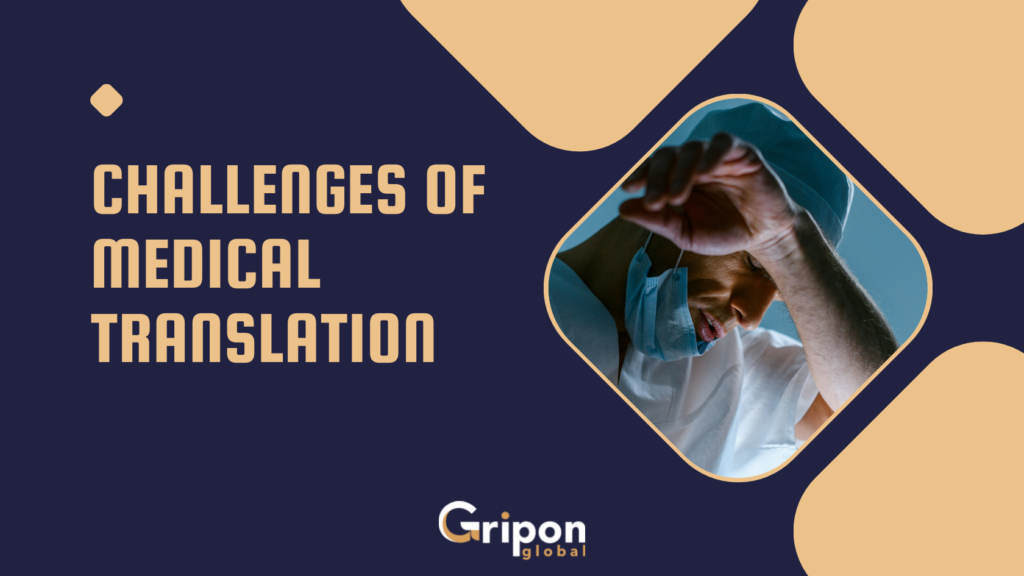
Challenges of Medical Translation
Medical translation is a specialized field that goes beyond mere language conversion.
It requires a deep understanding of medical terminology, cultural nuances, and regulatory requirements. While it plays a critical role in global healthcare, it’s not without complications.
It comes with its own set of challenges that professionals learn to navigate. Let’s check them out.
Table of Contents
ToggleNavigating Complex Medical Terminology
Medical terminology is extremely complex and ever-evolving.
Translators must have an in-depth understanding of medical terms and their specific meanings in both the source and target languages.
This complexity is further compounded by the use of acronyms, abbreviations, and eponyms, which can have different interpretations in different languages. A slight misinterpretation can lead to serious consequences, such as incorrect treatments or misdiagnoses.
For instance, the term “myocardial infarction” must be precisely translated to convey the exact medical condition it describes. An inaccurate translation might simply refer to it as a “heart problem,” which is far too vague and can lead to misunderstanding the severity and specific nature of the condition.
Ensuring Regulatory Compliance
Different countries have specific regulatory requirements for medical documentation. Medical translators must be familiar with these regulations to ensure that translations meet all legal and regulatory standards.
This includes knowing the required formats, terminologies, and legal stipulations for each country.
For example, the European Medicines Agency (EMA) has stringent guidelines for translating product information into the 24 official languages of the European Union. Any deviation from these guidelines can result in legal repercussions, product recalls, or delays in the approval process.
Maintaining Cultural Sensitivity
Cultural sensitivity is crucial in medical translation. A term or phrase that is acceptable in one culture might be offensive or misunderstood in another.
Translators must consider cultural nuances and local medical practices to ensure that translations are not only accurate but also culturally appropriate.
For instance, certain medical conditions or procedures may be described differently based on cultural perceptions. Mental health conditions, for example, are often stigmatized in some cultures.
Translating related documents requires careful consideration to avoid reinforcing these stigmas while ensuring the message is conveyed accurately and respectfully.
Handling Multilingual Medical Records
Medical records often contain information from various healthcare providers, each possibly using different terminologies and languages.
Translating these records accurately requires a thorough understanding of the context and continuity of care. This challenge is particularly pronounced in regions with diverse linguistic populations, such as the U.S.A.
Translators must piece together information from different sources while maintaining consistency and accuracy.
This involves cross-referencing terms and ensuring that the translated records present a coherent and complete medical history for the patient.
Addressing Rapid Advancements
The medical field is continuously evolving with new treatments, technologies, and terminologies emerging regularly. Medical translators must stay updated with these advancements to ensure their translations are current and accurate. This requires ongoing training with the latest developments in medical science.
For example, the rapid development of COVID-19 vaccines introduced new terminologies and concepts that needed accurate translation.
Translators had to quickly adapt to these changes and ensure that all related documentation was translated correctly and disseminated promptly.
Ensuring Accuracy in Emergency Situations
In emergency medical situations, accurate and swift translation is critical. Any delay or error in translation can have life-threatening consequences.
Translators must work under pressure to provide precise translations of medical instructions, patient conditions, and treatment plans.
Emergency medical translation often involves real-time interpretation services, where translators must quickly and accurately convey information between patients and healthcare providers.
This requires not only linguistic proficiency but also the ability to remain calm and focused under pressure.
Protecting Patient Confidentiality
Medical information is highly sensitive and must be handled with the utmost confidentiality. Translators must adhere to strict confidentiality agreements and data protection laws, such as HIPAA in the United States or GDPR in Europe.
Ensuring patient confidentiality involves secure handling of medical documents, encrypted communication channels, and strict adherence to privacy regulations.
Any breach of confidentiality can result in legal consequences and loss of trust from patients and healthcare providers.
Overcoming Language-Specific Challenges
Certain languages present unique challenges in medical translation. For instance, languages that lack specific medical terms require creative solutions to convey the same meaning.
Similarly, languages with complex grammatical structures can complicate the translation process.
For example, translating medical documents into languages with a high degree of inflection, such as Russian or Finnish, requires meticulous attention to grammatical details to ensure clarity and accuracy.
Translators must navigate these language-specific challenges while maintaining the integrity of the medical information.
Conclusion
In conclusion, medical translation is a highly specialized and challenging field. It requires a deep understanding of medical terminology, cultural nuances, regulatory requirements, and linguistic proficiency.
Not everyone is up to the challenge, but Gripon Global is. We have the expertise, tools, and man-power to take on any medical project. We ensure confidentiality, accuracy, and cultural sensitivity.